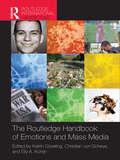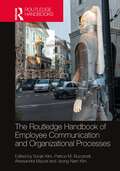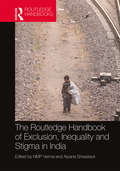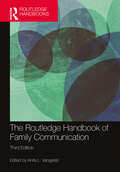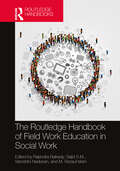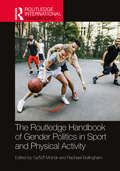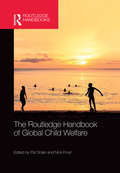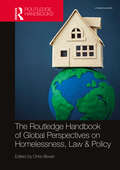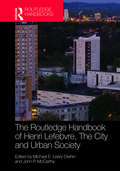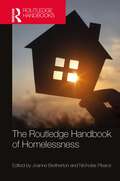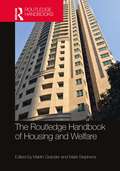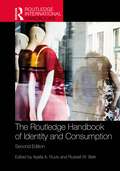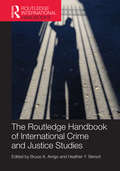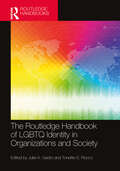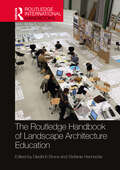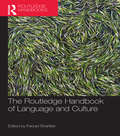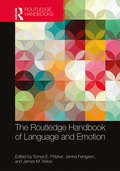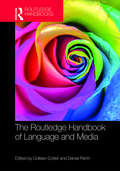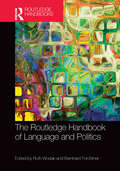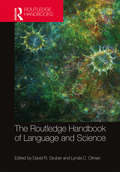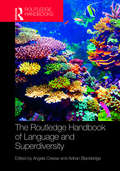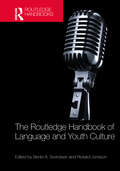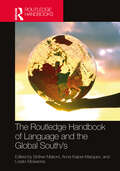- Table View
- List View
The Routledge Handbook of Emotions and Mass Media
by Katrin DövelingThe impact of mass media on individuals and society is to a great extent based on human emotions. Emotions, in turn, are essential in understanding how media messages are processed as well as media’s impact on individual and social behavior and public social life. Adopting an interdisciplinary approach to the study of emotions within a mass media context, the Handbook of Emotions and Mass Media addresses areas such as evolutionary psychology, media entertainment, sociology, cultural studies, media psychology, political communication, persuasion, and new technology. Leading experts from across the globe explore cutting-edge research on issues including the evolutionary functions of mediated emotions, emotions and media entertainment , measurements of emotions within the context of mass media, media violence, fear-evoking media, politics and public emotions, features , forms and functions of emotions beyond the message, and provide the reader a glimpse into future generations of media technology. This compelling and authoritative Handbook is an essential reference tool for scholars and students of media, communication studies, media psychology, emotions, cultural studies, sociology, and other related disciplines.
The Routledge Handbook of Employee Communication and Organizational Processes (Routledge Studies in Communication, Organization, and Organizing)
by Patrice M. Buzzanell Jeong-Nam Kim Soojin Kim Alessandra MazzeiThis Routledge Handbook takes a truly global and multidisciplinary approach to exploring all facets of employee communication.Beginning with two key disciplinary approaches—organizational communication and public relations—scholars capture and define employee communication from both perspectives, addressing commonalities and bridging disciplinary differences. This volume places importance on the everyday communicative behaviors by internal members such as leaders, managers, inter/generational cohorts, employees, and those working on behalf of organizations, such as social media influencers, and on expansive conceptualizations of employee communication such as chatbots, environment, and global supply chain members involved in organizing. With a focus on employees in situ, the authors respond to these key questions: in what ways is employee communication relevant today? What does employee communication entail? How, why, and to what extent does employee communication influence or become influenced by organizational processes?Investigating antecedents, organizational contexts and processes, and consequences of employee communication, and offering key theoretical information and empirically driven recommendations for practice, this handbook will be an essential resource for students, researchers, and industry practitioners in employee communication, organizational communication, business and management, leadership communication, and public relations more generally.
The Routledge Handbook of Exclusion, Inequality and Stigma in India
by N. M. P. Verma Alpana SrivastavaThis handbook critically examines the three concepts of exclusion, inequality and stigma and their interrelationship in the Indian context. Divided into five parts, the volume deals with the issues of exclusion, inequality, gender discrimination, health and disability, and assault and violence. It discusses important topical themes such as caste and social exclusion in rural labour markets, impact of poverty and unemployment, discrimination in education and literacy, income inequality and financial inclusion, social security of street vendors, women social entrepreneurs, rural–urban digital divide, workplace inequality, women trafficking, acid attacks, inter-caste marriages, honour killings, health care and sanitation, discrimination faced by those with disabilities, and regional disparities in India. The book traces rising socio-economic inequality and discrimination along with the severe lack of access to resources and opportunities, redressal instruments, legal provisions and implementation challenges, while also looking at deep-rooted causes responsible for their persistence in society. With emphasis on affirmative action, systemic mechanisms, and the role of state and citizens in bridging gaps, the volume presents several policies and strategies for development. It combines wide-ranging empirical case studies backed by relevant theoretical frameworks to map out a new agenda for research on socio-economic inequality in India with important implications for public policy. Comprehensive and first of its kind, this handbook will serve as a key reference to scholars, researchers and teachers of exclusion and discrimination studies, social justice, political economy, sociology, anthropology, economics, political science, development studies, education and public administration. It will also be useful to policymakers, bureaucrats, civil society activists, non-governmental organisations and social entrepreneurs in the development sector, in addition to those interested in third world studies, developing economies and the global south.
The Routledge Handbook of Family Communication (ISSN)
by Anita L. VangelistiThis third edition again brings together interdisciplinary contributions to provide a comprehensive and multifaceted resource that reflects the breadth and depth of research on family communication and family relationships.Chapters continue to address theoretical and methodological issues influencing current conceptions of family and cover communication occurring in a variety of family forms and across social, cultural, and physical contexts.This third edition includes key updates, such as: The use and influence of social media and technology in families Parenting and communication in culturally and structurally diverse families Communication and physical health of family members Managing personal information about difficult topics in families The influence of the COVID-19 pandemic on family members This handbook is ideal for students and researchers interested in interpersonal and family communication, relationships, and family therapy within the disciplines of communication, social psychology, clinical psychology, sociology, and family studies.
The Routledge Handbook of Field Work Education in Social Work
by Rajendra Baikady, Sajid S.M., Varoshini Nadesan, and M. Rezaul IslamThis Handbook provides an authoritative account of international fieldwork education in social work. It presents an overview of advances in research in social work field education through in-depth analyses and global case studies. Key features: * Discusses critical issues in teaching social work and curriculum development; health care social work; stimulated learning; field education policies; needs, challenges, and solutions in fieldwork education; reflexivity training; creativity and partnership; resilience enhancement; integrated and holistic education for social workers; student experience; practice education; and ethical responsibility of social work field instructors. * Covers social work field education across geographical regions (Asia and the Pacific; North and South America; Australia and Oceania; Europe) and major themes and trends from several countries (U.S.A.; Canada; Australia; China; Hong Kong; Sweden; Aotearoa New Zealand; England; Ukraine; Spain; Estonia; Italy; Ireland; Slovenia; Poland; Romania; Greece; Norway; Turkey; and the Czech Republic). * Brings together international comparative perspectives on fieldwork education in social work from leading experts and social work educators. This Handbook will be an essential resource for scholars and researchers of social work, development studies, social anthropology, sociology, and education. It will also be useful to educators and practitioners of social work in global institutions of higher studies as well as civil society organisations.
The Routledge Handbook of Gender Politics in Sport and Physical Activity (Routledge International Handbooks)
by Győző MolnárThis progressive and broad-ranging handbook offers a comprehensive overview of the complex intersections between politics, gender, sport and physical activity, shining new light on the significance of gender, sport and physical activity in wider society. Featuring contributions from leading and emerging researchers from around the world, the book makes the case that gender studies and critical thinking around gender are of particular importance in an era of increasingly intolerant populist politics. It examines important long-term as well as emerging themes, such as recent generational shifts in attitudes to gender identity in sport and the socio-cultural expectations on men and women that have traditionally influenced and often disrupted their engagement with sport and physical activity, and explores a wide range of current issues in contemporary sport, from debates around the contested gender binary and sex verification, to the role of the media and social media, and the significance of gender in sport leadership, policy and decision-making. This book is an authoritative survey of the current state of play in research connecting gender, sport, physical activity and politics, and is an important contribution to both sport studies and gender studies. It is fascinating reading for any student, researcher, policy-maker or professional with an interest in sport, physical activity, social studies, public health or political science.
The Routledge Handbook of Global Child Welfare (Routledge International Handbooks)
by Nick Frost Pat DolanIn the context of the increasing global movement of people and a growing evidence base for differing outcomes in child welfare, Routledge Handbook of Global Child Welfare provides a compelling account of child welfare, grounded in the latest theory, policy and practice. Drawing on eminent international expertise, the book offers a coherent and comprehensive overview of the policies, systems and practices that can deliver the best outcomes for children. It considers the challenges faced by children globally, and the difference families, services and professionals can make. This ambitious and far-reaching handbook is essential reading for everyone working to make the world a better and safer place for children.
The Routledge Handbook of Global Perspectives on Homelessness, Law & Policy
by Chris BevanThis handbook provides a comprehensive global survey and assessment of the law and policy relating to homelessness prevention. Homelessness is regarded internationally as one of the most pressing issues facing humanity and one of the greatest social challenges of our times. This has been further amplified as a result of the Covid-19 pandemic. Across the globe, there is an enormous divergence in both experiences of and responses to homelessness from governments and state actors. This handbook examines how different jurisdictions from across all five continents of the world have encountered, framed and responded to homelessness. Written by expert scholars and leaders in their field, the book engages in a multidisciplinary and comparative analysis of homelessness as an issue of acute social concern. Understandings of homelessness are geographically, culturally and historically situated, making analysis of each jurisdiction’s approach by a national expert deeply insightful. The collection examines legal and extra-legal policy interventions targeted at reducing or preventing homelessness from across the globe. Drawing on diverse perspectives, differing cultures and welfare regimes, it thus constitutes a timely evaluation of current approaches to homelessness internationally. This book will appeal to students and scholars of homelessness, sociology, social policy, anthropology, and urban sociology, as well as international and national policymakers.
The Routledge Handbook of Henri Lefebvre, The City and Urban Society
by Michael E. Leary-Owhin John P. McCarthyThe Routledge Handbook of Henri Lefebvre,The City and Urban Society is the first edited book to focus on Lefebvre's urban theories and ideas from a global perspective, making use of recent theoretical and empirical developments, with contributions from eminent as well as emergent global scholars. The book provides international comparison of Lefebvrian research and theoretical conjecture and aims; to engage with and critique Lefebvre's ideas in the context of contemporary urban, social and environmental upheavals; to use Lefebvre's spatial triad as a research tool as well as a point of departure for the adoption of ideas such as differential space; to reassess Lefebvre's ideas in relation to nature and global environmental sustainability; and to highlight how a Lefebvrian approach might assist in mobilising resistance to the excesses of globalised neoliberal urbanism. The volume draws inspiration from Lefebvre's key texts (The Production of Space; Critique of Everyday Life; and The Urban Revolution) and includes a comprehensive introduction and concluding chapter by the editors. The conclusions highlight implications in relation to increasing spatial inequalities; increasing diversity of needs including those of migrants; more authoritarian approaches; and asymmetries of access to urban space. Above all, the book illustrates the continuing relevance of Levebvre's ideas for contemporary urban issues and shows – via global case studies – how resistance to spatial domination by powerful interests might be achieved. The Handbook helps the reader navigate the complex terrain of spatial research inspired by Lefebvre. In particular the Handbook focuses on: the series of struggles globally for the 'right to the city' and the collision of debates around the urban age, 'cityism' and planetary urbanisation. It will be a guide for graduate and advanced undergraduate teaching, and a key reference for academics in the fields of Human Geography, Sociology, Political Science, Applied Philosophy, Planning, Urban Theory and Urban Studies. Practitioners and activists in the field will also find the book of relevance.
The Routledge Handbook of Homelessness
by Joanne Bretherton Nicholas PleaceThe Routledge Handbook of Homelessness brings together many of the world’s leading scholars in the field to provide a cutting-edge overview of classic and current research and future trends in the subject. Comprising 41 chapters and divided into four sections, the handbook includes A comprehensive introduction to homelessness, referring to history, culture, causation and definitions. Contemporary and historical debates around homelessness in different academic disciplines. Homelessness relating to gender, sexuality, youth, families, migration, rurality, veterans and health. A range of country-specific studies to illustrate the ways in which homelessness is researched and understood around the world. Methods of engagement and modes of analysis. With contributors from around the world and editors from the Centre of Housing Policy at the University of York, this handbook provides a groundbreaking and authoritative guide to theory, method and the primary interdisciplinary debates of today on homelessness. It will be essential reading for students, academics and professionals across the disciplines of sociology, human geography, public policy, housing policy, social policy, social work, economics and criminology.
The Routledge Handbook of Housing and Welfare
by Mark Stephens Martin GranderThis handbook takes on one of the most pressing issues of today’s society – the question of housing. It is a cutting-edge edited volume about the disputed interrelationship between housing and the wider welfare state. Although housing scholars generally agree that housing should be regarded as part of such a wider welfare system, it has proven hard to pinpoint and operationalize its position within it. Moreover, the relationship became considerably more complex as a result of the period of intense globalization and the integration of national housing finance systems into world finance markets. Furthermore, welfare systems reflect economic as well as social models and these, too, have changed as countries have responded to globalization, and traditional ideological frameworks have become less distinct. Thus, there is a need to redefine the connection between housing and welfare in light of changes in both welfare and housing systems. By investigating the current situation and historical development of housing provision and welfare distribution in different contexts worldwide, this book aims to contribute to an expanded understanding of housing and welfare. The book brings together 25 international housing researchers covering 15 countries worldwide. With such a global approach, the book aims to provide an updated empirical picture and analysis of different housing systems and their connection to the welfare regime in different national contexts. The book moves beyond the usual focus on affordable housing provision in the context of well-developed welfare regimes and includes countries from the global south, incorporating regions where it is debatable whether there are welfare systems present at all. Thus, the book aims to provide the reader with an insight into the large differences in housing provision in international contexts with large differences regarding how the welfare state is comprised. From these insights, we reflect on whether regime approaches continue to provide a suitable theoretical framework for understanding the relationship between housing and the wider welfare state. This handbook is essential reading for researchers, students, policymakers, and other professionals in the fields of housing studies, welfare studies, economics, urban studies, social work, social and public policy, and sociology.
The Routledge Handbook of Identity and Consumption (Routledge International Handbooks)
by Russell W. Belk Ayalla A. Ruvio"Tell me what you eat, I'll tell you who you are," said Anthelme Brillat-Savarin. Today, "You are what you consume" is more apt. Barbara Krueger’s ironic twist of Descartes – "I shop therefore I am" – has lost its irony. Such phrases have become commonplace descriptions of our identity in the contemporary world. In our materialistic world, it seems as if there is no debate that our consumption behavior is fused with our self-identity – shaping it, changing it, and often challenging it.The Routledge Handbook of Identity and Consumption introduces the reader to state-of-the-art research, written by the world’s leading scholars regarding the interplay between identity and consumption. The book addresses the diverse issues regarding the ways identity affects our consumption behaviour and vice-versa and in doing so presents a broad perspective on the dynamics of self-identity and consumption.With chapters discussing the theory, research, and practical implications of these dynamics, including the way they change across our life span and their expression within different social, cultural, and religious contexts, this book will be a valuable reference source for students and academics from a variety of disciplines.
The Routledge Handbook of International Crime and Justice Studies (Routledge International Handbooks)
by Bruce A. Arrigo Heather Y. BersotThe Routledge Handbook of International Crime and Justice Studies presents the enduring debates and emerging challenges in crime and justice studies from an international and multi-disciplinary perspective. Guided by the pivotal, although vastly under-examined, role that consumerism, politics, technology, and culture assume in shaping these debates and in organizing these challenges, individual chapters probe the global landscape of crime and justice with astonishing clarity and remarkable depth. A distinguished collection of experts examine the interdisciplinary field of international crime and justice. Their contributions are divided into thematic sections, including: theory, culture, and society industries of crime and justice: systems of policing, law, corrections and punishment the criminal enterprise global technologies media, crime, and culture green criminology political violence public health criminology the political economy of crime and justice. All the chapters include full pedagogy and instructional resources for easy referencing or classroom use. This Handbook will be useful for students, scholars and practitioners of law, medicine, history, economics, sociology, politics, philosophy, education, public health, and social policy.
The Routledge Handbook of LGBTQ Identity in Organizations and Society (Routledge International Handbooks)
by Tonette S. Rocco Julie A. GedroSexuality, gender, gender identity, and gender expression are fluid constructs, and the ways in which identity development intersects with organizations and exists in society are complex. The book is comprised of a range of multi-disciplinary and globally inspired perspectives representing leading-edge scholarship by authors from over a dozen countries on a range of issues and contexts regarding LGBTQ identity and experience. It is intended for a wide readership: those who are in LGBTQ-related academic fields; those who want to broaden their coursework by offering supplemental readings that center the perspectives of LGBTQ identities; and those who want to acquire knowledge and education on the subject of LGBTQ identity. There are 36 chapters written by scholars in fields such as social work, law, queer studies, business, human resource management and development, entrepreneurship, criminal justice, economics, marketing, religion, architecture, sport, theater, psychology, human ecology, and adult education. The chapters can be read in sequence, and the book can also be used as a reference work for which educators, practitioners, and non-academics can identify and select particular chapters that inform areas of inquiry.
The Routledge Handbook of Landscape Architecture Education (Routledge International Handbooks)
by Diedrich Bruns Stefanie HenneckeIn this handbook, 60 authors, senior and junior educators, and researchers from six continents provide an overview of 200 years of landscape architectural education. They tell the stories of schools and people, of visions, and of experiments that constitute landscape architecture education heritage. Through taking an international perspective, the handbook centers inclusivity with an appreciation for how education develops in different political and societal contexts. Part I introduces the field of education history research, including research approaches and international research exchange. Spanning more than 100 years, Parts II and III investigate and compare early and recent histories of landscape architecture education in different countries and schools. In Part IV, the book offers new perspectives for landscape architecture education. Education research presents a substantial opportunity for challenging studies to increase the pedagogic and didactic, the academic and historic, and the disciplinary knowledge basis. Through a boundary-crossing approach, these studies about landscape architecture education provide a reference to teachers and students, policymakers, and administrators, who strive for innovative, holistic, and interdisciplinary practice.
The Routledge Handbook of Landscape Architecture Education (Routledge International Handbooks)
by Diedrich Bruns Stefanie HenneckeIn this handbook, 60 authors, senior and junior educators, and researchers from six continents provide an overview of 200 years of landscape architectural education. They tell the stories of schools and people, of visions, and of experiments that constitute landscape architecture education heritage. Through taking an international perspective, the handbook centers inclusivity with an appreciation for how education develops in different political and societal contexts. Part I introduces the field of education history research, including research approaches and international research exchange. Spanning more than 100 years, Parts II and III investigate and compare early and recent histories of landscape architecture education in different countries and schools. In Part IV, the book offers new perspectives for landscape architecture education. Education research presents a substantial opportunity for challenging studies to increase the pedagogic and didactic, the academic and historic, and the disciplinary knowledge basis.Through a boundary-crossing approach, these studies about landscape architecture education provide a reference to teachers and students, policymakers, and administrators, who strive for innovative, holistic, and interdisciplinary practice.
The Routledge Handbook of Language and Culture (Routledge Handbooks in Linguistics)
by Farzad SharifianThe Routledge Handbook of Language and Culture presents the first comprehensive survey of research on the relationship between language and culture. It provides readers with a clear and accessible introduction to both interdisciplinary and multidisciplinary studies of language and culture, and addresses key issues of language and culturally based linguistic research from a variety of perspectives and theoretical frameworks. This Handbook features thirty-three newly commissioned chapters which cover key areas such as cognitive psychology, cognitive linguistics, cognitive anthropology, linguistic anthropology, cultural anthropology, and sociolinguistics offer insights into the historical development, contemporary theory, research, and practice of each topic, and explore the potential future directions of the field show readers how language and culture research can be of practical benefit to applied areas of research and practice, such as intercultural communication and second language teaching and learning. Written by a group of prominent scholars from around the globe, The Routledge Handbook of Language and Culture provides a vital resource for scholars and students working in this area.
The Routledge Handbook of Language and Emotion (Routledge Handbooks in Linguistics)
by Sonya E. Pritzker Janina Fenigsen James M. WilceThe Routledge Handbook of Language and Emotion offers a variety of critical theoretical and methodological perspectives that interrogate the ways in which ideas about and experiences of emotion are shaped by linguistic encounters, and vice versa. Taking an interdisciplinary approach which incorporates disciplines such as linguistic anthropology, sociolinguistics, applied linguistics, psychology, communication studies, education, sociology, folklore, religious studies, and literature, this book: explores and illustrates the relationship between language and emotion in the five key areas of language socialisation; culture, translation and transformation; poetry, pragmatics and power; the affective body-self; and emotion communities; situates our present-day thinking about language and emotion by providing a historical and cultural overview of distinctions and moral values that have traditionally dominated Western thought relating to emotions and their management; provides a unique insight into the multiple ways in which language incites emotion, and vice versa, especially in the context of culture. With contributions from an international range of leading and emerging scholars in their fields, The Routledge Handbook of Language and Emotion is an indispensable resource for students and researchers who are interested in incorporating interdisciplinary perspectives on language and emotion into their work.
The Routledge Handbook of Language and Media
by Colleen Cotter Daniel PerrinThe Routledge Handbook of Language and Media provides an accessible and comprehensive overview of state-of-the-art research in media linguistics. This handbook analyzes both language theory and practice, demonstrating the vital role of this research in understanding language use in society. With over thirty chapters contributed by leading academics from around the world, this handbook: addresses issues of language use, form, structure, ideology, practice, and culture in the context of both traditional and new communication media; investigates mediated language use in public spheres, organizations, and personal communication, including newspaper journalism, broadcasting, and social media; examines the interplay of language and media from both linguistic and media perspectives, discussing auditory and visual media and graphic modes, as well as language and gender, multilingualism, and language change; analyzes the advantages and shortcomings of current approaches within media linguistics research and outlines avenues for future research. The Routledge Handbook of Language and Media is a must-have survey of this key field, and is essential reading for those interested in media linguistics.
The Routledge Handbook of Language and Politics (Routledge Handbooks in Linguistics)
by Ruth Wodak and Bernhard ForchtnerThe Routledge Handbook of Language and Politics provides a comprehensive overview of this important and dynamic area of study and research. Language is indispensable to initiating, justifying, legitimatising and coordinating action as well as negotiating conflict and, as such, is intrinsically linked to the area of politics. With 45 chapters written by leading scholars from around the world, this Handbook covers the following key areas: Overviews of the most influential theoretical approaches, including Bourdieu, Foucault, Habermas and Marx; Methodological approaches to language and politics, covering – among others – content analysis, conversation analysis, multimodal analysis and narrative analysis; Genres of political action from speech-making and policy to national anthems and billboards; Cutting-edge case studies about hot-topic socio-political phenomena, such as ageing, social class, gendered politics and populism. The Routledge Handbook of Language and Politics is a vibrant survey of this key field and is essential reading for advanced students and researchers studying language and politics.
The Routledge Handbook of Language and Science (Routledge Handbooks in Linguistics)
by Lynda C. Olman David R. GruberThe Routledge Handbook of Language and Science provides a state-of-the-art volume on the language of scientific processes and communications. This book offers comprehensive coverage of socio-cultural approaches to science, as well as analysing new theoretical developments and incorporating discussions about future directions within the field. Featuring original contributions from an international range of renowned scholars, as well as academics at the forefront of innovative research, this handbook: identifies common objects of inquiry across the areas of rhetoric, sociolinguistics, communication studies, science and technology studies, and public understanding of science covers the four key themes of power, pedagogy, public engagement, and materiality in relation to the study of scientific language and its development uses qualitative and quantitative approaches to demonstrate how humanities and social science scholars can go about studying science details the meaning and purpose of socio-cultural approaches to science, including the impact of new media technologies analyses the history of the field and how it positions itself in relation to other areas of study Ushering the study of language and science toward a more interdisciplinary, diverse, communal and ecological future, The Routledge Handbook of Language and Science is an essential reference for anyone with an interest in this area.
The Routledge Handbook of Language and Science (Routledge Handbooks in Linguistics)
by R. Gruber Lynda C. OlmanThe Routledge Handbook of Language and Science provides a state-of-the-art volume on the language of scientific processes and communications. This book offers comprehensive coverage of socio-cultural approaches to science, as well as analysing new theoretical developments and incorporating discussions about future directions within the field. Featuring original contributions from an international range of renowned scholars, as well as academics at the forefront of innovative research, this handbook: identifies common objects of inquiry across the areas of rhetoric, sociolinguistics, communication studies, science and technology studies, and public understanding of science; covers the four key themes of power, pedagogy, public engagement, and materiality in relation to the study of scientific language and its development; uses qualitative and quantitative approaches to demonstrate how humanities and social science scholars can go about studying science; details the meaning and purpose of socio-cultural approaches to science, including the impact of new media technologies; analyses the history of the field and how it positions itself in relation to other areas of study. Ushering the study of language and science toward a more interdisciplinary, diverse, communal and ecological future, The Routledge Handbook of Language and Science is an essential reference for anyone with an interest in this area.
The Routledge Handbook of Language and Superdiversity (Routledge Handbooks in Applied Linguistics)
by Angela Creese Adrian BlackledgeThe Routledge Handbook of Language and Superdiversity provides an accessible and authoritative overview of this growing area, the linguistic analysis of interaction in superdiverse cities. Developed as a descriptive term to account for the increasingly stratified processes and effects of migration in Western Europe, ‘superdiversity’ has the potential to contribute to an enhanced understanding of mobility, complexity, and change, with theoretical, practical, global, and methodological reach. With seven sections edited by leading names, the handbook includes 35 state-of-the art chapters from international authorities. The handbook adopts a truly interdisciplinary approach, covering: Cultural heritage Sport Law Education Business and entrepreneurship. The result is a truly comprehensive account of how people live, work and communicate in superdiverse spaces. This volume is key reading for all those engaged in the study and research of Language and Superdiversity within Applied Linguistics, Linguistic Anthropology and related areas.
The Routledge Handbook of Language and Youth Culture (Routledge Handbooks in Applied Linguistics)
by Bente A. Svendsen and Rickard JonssonThe Routledge Handbook of Language and Youth Culture offers the first essential grounding of critical youth studies within sociolinguistic research. Young people are often seen to be at the frontline of linguistic creativity and pioneering communicative technologies. Their linguistic practices are considered a primary means of exploring linguistic change as well as the role of language in social life, such as how language and identity, ideology and power intersect. Bringing together leading and cutting-edge perspectives from thought leaders across the globe, this handbook: • addresses how young people’s cultural practices, as well as forces like class, gender, ethnicity and race, influence language • considers emotions, affect, age and ageism, materiality, embodiment and the political youth, as well as processes of unmooring language and place • critically reflects on our understandings of terms such as ‘language’, ‘youth’ and ‘culture’, drawing on insights from youth studies to help contextualise age within power dynamics • features examples from a wide range of linguistic contexts such as social media and the classroom, as well as expressions such as graffiti, gestures and different musical genres including grime and hip-hop. Providing important insights into how young people think, feel, act, and communicate in the complexity of a polarised world, The Routledge Handbook of Language and Youth Culture is an invaluable resource for advanced students and researchers in disciplines including sociolinguistics, linguistic anthropology, multilingualism, youth studies and sociology.
The Routledge Handbook of Language and the Global South/s (Routledge Handbooks in Applied Linguistics)
by Sinfree Makoni Anna Kaiper-Marquez Lorato MokwenaThis Handbook centers on language(s) in the Global South/s and the many ways in which both "language" and the "Global South" are conceptualized, theorized, practiced, and reshaped. Drawing on 31 chapters situated in diverse geographical contexts, and four additional interviews with leading scholars, this text showcases: Issues of decolonization Promotion of Southern epistemologies and theories of the Global South/s A focus on social/applied linguistics An added focus on the academy A nuanced understanding of global language scholarship. It is written for emerging and established scholars across the globe as it positions Southern epistemologies, language scholarship, and decolonial theories into scholarship surrounding multiple themes and global perspectives.
